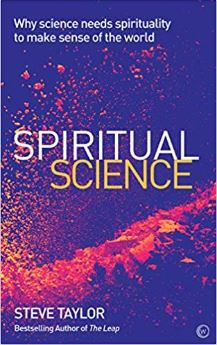|
TRANSLATE THIS ARTICLE
Integral World: Exploring Theories of Everything
An independent forum for a critical discussion of the integral philosophy of Ken Wilber
 Steve Taylor is a senior lecturer in psychology at Leeds Beckett University, and the author of several best-selling books on psychology and spirituality. He is the current chair of the Transpersonal Psychology Section of the British Psychological Society. He is the author of The Leap and his new book Spiritual Science: Why the science needs spirituality to make sense of the world, Watkins Publising, 2018. See: www.stevenmtaylor.com
Misplaced Faith
Science, Scientism and Materialist Metaphysics
A Response to Lane
Steve Taylor
But in any case, why on earth should materialism take precedence over other metaphysical approaches?
I am grateful to David Lane for his response to my essay 'Beyond Materialism.' Throughout the essay he points out that science is a successful, practical enterprise, involving the investigation of phenomena and the reaching conclusions about them based on evidence. He suggests that this makes science superior to spirituality.
However, I do not have any issue with science as an enterprise. In fact, as I try to make clear in my book Spiritual Science (on which my essay is based), I revere science, and am an enthusiastic advocate of the scientific approach. Surely it's clear from my article that I am not attacking science as an enterprise, but the metaphysical system of materialism, which is often (mistakenly) associated with science itself. I am suggesting that, in order to have any real explanatory ability, science has to unmoor itself from a materialist perspective and adopt a spiritual one - specifically, the idea that the essential reality of the universe is not matter, but consciousness. This is nothing to do with science as an enterprise.
The fact that Lane continuously assumes that I am criticising science as a practice - when in fact I'm just criticising materialism - shows that, in his mind, science is synonymous with materialism. This is a serious philosophical error. Being - as Lane rightfully advocates - 'patient, empirical detectives' does not at all mean that we have to stick to materialism, and attempt to explain away psi phenomena. Materialism does not, and should not, have a monopoly over science as a practice.
Rogue Phenomena
 Etzel Cardena
Etzel Cardena
Lane writes that “scientists have made enormous progress in understanding 'rogue' phenomena especially since the information we garner about any so-called paranormal event tends to yield (via Occam's Razor and Laplace's Dictum) a less complicated explanation.” This is a very tenuous assertion. Scientists have made no progress in understanding “rogue” phenomena like near-death experiences, psi phenomena like telepathy or precognition, or even consciousness itself. There is growing sense of disappointment at the continual failure of neuroscience to explain consciousness, which has led to a movement away from reductionist physicalist explanations, as evidenced by the recent revival of panpsychism. Christof Koch's movement away from simplistic neurological reductionism (he was originally Francis Crick's co-researcher in his attempts to identify the neural correlates of consciousness) towards panpsychism typifies this. At the same time, the publication of the articles like Etzel Cardena's 'The experimental evidence for parapsychological phenomena: A Review' in a recent issue of the American Psychologist testifies to a new openness towards psi phenomena. (Cardena surveys the evidence and suggests that it cannot be explained away.)
Even Lane's use of term 'rogue' is telling. These phenomena are only rogue from the standpoint of materialism. They are only rogue because they contravene the assumptions of materialism. Lane's use of this term shows that he has already adopted materialism as his default metaphysical position and classifies phenomena according to whether they are acceptable in terms of its assumptions. This isn't so different from a religious person who classifies phenomena as good or evil according to whether they accord with their beliefs.
Privileging Materialism
Lane goes to suggest that “we haven't fully explored or exhausted the physicalist world enough and instead we invoke spirits of the gaps like causations in our desire to bring back god or purpose into the proceedings.” As Lane himself notes, this is what the philosopher John Eccles described as 'promissory materialism.' There is an underlying assumption that materialism will one day prevail. But when do we get the go ahead to apply different metaphysical approaches? At what point do we decide that materialism doesn't fit the bill?
In fact, I believe that we have reached this point already. Surely after decades of attempting and failing to account for consciousness in neurological terms, it is time to admit failure and try different approaches. Surely after decades after attempting and failing to explain psi phenomena as fraud, and to explain near-death experiences in neurological terms, it is time to adopt other perspectives.
But in any case, why on earth should materialism take precedence over other metaphysical approaches? Why should it be given first option in the effort to explain the world? This is philosophical bias. It is no different to a Christian saying that we should only abandon Christianity and investigate other religions once it has been proven beyond doubt that its tenets are false. This metaphor is quite apt, in the sense that it is clear that Lane has adopted materialism as his own metaphysical system to explain the world. That's fine, of course. It's his choice. But like many materialists, he doesn't seem to be aware that he has adopted a metaphysical position, as his constant association of materialism with science as a practice shows.
Metaphysics is the area of philosophy that deals with the big questions about life and the world that most human beings wrestle with in their minds at some point - questions like 'What is the nature of reality?' 'Does life have a meaning?' 'Is there life after death?' or 'Is the world an illusion generated by our minds?' Materialism is clearly a metaphysical system in the sense that it has its own answers to all of the big questions, and its own perspective on the nature of reality. The metaphysical system of materialism tell us, for example, that matter is the primary reality, there is no God or soul or life after death, and life has no meaning except survival and reproduction, and so on. This metaphysical system has become so bound up with science as an enterprise that many people assume the two are synonymous.
Science and Scientism
Lane ends the essay by describing the sad case of his friend Bob, who has suffered brain damage to a stroke, and whose doctors are looking for a cure by examining his brain activity. He writes that,
“In looking for a cure, doctors are focusing on his brain from a purely physicalist perspective. They are not engaged in ontological arguments about whether his brain is a receiving station for some indelible spiritual force or whether materialism is bankrupt.” This is very true. But again there is confusion between science as a practice and materialism/physicalism as a metaphysical framework. By investigating the brain scientifically, neuroscientists are manifestly not adopting a physicalist position. They are just examining the brain in a scientific way. They are just examining the brain as a material entity, in an effort to identity problems with it. It is irrelevant whether the functioning of the brain is interpreted in a physicalist, a panpsychist or a panspiritist perspective.
You do not have to adopt a philosophical position in order to do brain surgery. This is exactly the kind of confusion of method and ontology that Lane accuses me of.
The same point applies with Lane's advocacy of attempts to study the brain. I completely agree that “understanding why such awareness waxes and wanes due to biochemistry and cranial capacity would be of elemental importance. So even here, the physicalist agenda holds court.” But again, examining biochemistry and neurological activity is not physicalism. You could equally hold a panpsychist or panspiritist view and study biochemistry and cranial capacity. Whether you see the brain as the generator or transmitter of consciousness, neurology is equally valuable.
Let me conclude with a similar case study to Lane's. Three years ago my mother contracted a brain infection called encephalitis. She was in a coma for several days. She recovered physically, but it soon became evident that she was not the person she had been before. She lost her short term memory, her autobiographical memory and her sense of continuous, stable identity. Now she lives in a nursing home. She still recognises close friends and family members, and sometimes we can have coherent conversations with her. She still has some of the same personality traits and behavioural tendencies as before, but it is clear that the person we knew is no longer there.
It would be wonderful if neuroscientists could examine her brain to try to identity the damage that has occurred and how this is linked to the changes she has undergone. That would be science as a practice. But the philosophical question of how to interpret the changes my mother has undergone is a separate one. For example, we could interpret her condition in physicalist terms, or in panspiritist terms. In physicalist terms, we would presume simply that damage to my mother's brain has affected her mental functioning, in the same way that damage to a computer affects it functioning. But from panspiritist terms, we could say that, because of her neurological damage, the brain's role as a transmitter of consciousness has been affected, in the same way that damage to radio stops it transmitting. You might even say that because of the damage to her brain, it is no longer able to act as a 'canaliser' of consciousness, so that she is no longer conscious, but simply a collection of old mental habits and behavioural traits.
The point here is that the metaphysical interpretation of my mother's predicament is completely distinct to science as an enterprise. Lane continually and misguidedly uses science as a justification for scientism. His faith in materialism is literally a faith - a quasi-religious attachment to a particular metaphysical framework. As John Eccles noted, promissory materialism is an irrational superstition,“simply a religious belief held by dogmatic materialists . . . who often confuse their religion with their science.”
FURTHER READING
Alex Fradera, "Parapsychology has been unfairly sidelined, claims a new review of the field", digest.bps.org.uk, July 2, 2018.
|
 Steve Taylor is a senior lecturer in psychology at Leeds Beckett University, and the author of several best-selling books on psychology and spirituality. He is the current chair of the Transpersonal Psychology Section of the British Psychological Society. He is the author of The Leap and his new book Spiritual Science: Why the science needs spirituality to make sense of the world, Watkins Publising, 2018. See: www.stevenmtaylor.com
Steve Taylor is a senior lecturer in psychology at Leeds Beckett University, and the author of several best-selling books on psychology and spirituality. He is the current chair of the Transpersonal Psychology Section of the British Psychological Society. He is the author of The Leap and his new book Spiritual Science: Why the science needs spirituality to make sense of the world, Watkins Publising, 2018. See: www.stevenmtaylor.com
